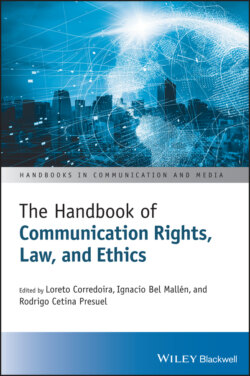Читать книгу The Handbook of Communication Rights, Law, and Ethics - Группа авторов - Страница 38
The Right to Seek Information
ОглавлениеThe right to seek information is understood (Desantes Guanter 1974, p. 93) as the ability of information professionals, information media more broadly, and the general public to directly access sources of information and opinions and receive this content without any limit whatsoever. From the theoretical and practical points of view, this is undoubtedly the most difficult ability to accept and to identify as being contained within communication rights. So far, with the exception of some published rules, the capability to seek information has not been regulated in both its facets – that is, the right of all individuals and the duty of those managing information sources. Though professional customs and practices strongly facilitate access to government offices, the reality of common practice suggests a more negative picture.
In direct conflict with this ability to research is the possibility of declaring information to be classified. This problem is evident in cases of official secrets and secrecy in summary judicial proceedings. It cannot be denied that the government – essentially the political and executive powers – has the right, under specific circumstances, to classify information that may affect internal or external security. However, it must be pointed out that, to avoid abuse, this right to official secrecy should be applied as restrictively as possible, and the length of time that information can remain classified should be proscribed. This question will be covered in detail in the third part of this volume.
The right to seek information includes the right to access public information, for which policies of transparency and information access should be implemented by the organizations and public bodies managing the information, without concern for the source, date, or storage medium of the information. This is a key point in journalism, documentation sciences, history, and archiving. The only possible limitations, which would have to be fixed, would be those established by law in a way that maximally guarantees the security and privacy of the individual. Some of these questions, such as those about sources and transparency, will be explored in greater depth by other authors in this volume. These questions are crucial in this era in which “open government” defines relations between government and governed.
Studies of corporations and nongovernmental organizations (NGOs) have revealed a proliferation of so-called press offices or communication departments that serve to disseminate information to external users. The freedom to seek information goes even further than this in order to arrive at the ultimate sources of information.
An increasing number of people have exercised their right to seek information through the Internet. However, various factors have led the universal subject – the general public – to adopt a passive attitude and to delegate searches to professionals. This makes sense in light of the legal and practical difficulties for the average individual to research information.
